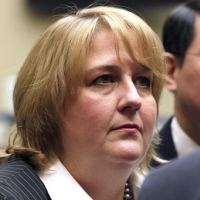Privacy Officers—from Government to Industry—Are Disillusioned and Under Fire
 Mary Ellen Callahan (photo: Carolyn Kaster, AP)
Mary Ellen Callahan (photo: Carolyn Kaster, AP)
In an era of ubiquitous government surveillance and corporate cooperation in domestic spying, the toughest job to have might just be as a privacy officer.
Not only are privacy officers often at odds with those eavesdropping on Americans’ communications, but they’re even accused of being threats to the nation’s security.
Take Mary Ellen Callahan, for example.
She was the chief privacy officer for the Department of Homeland Security (DHS) from 2009 until 2012, putting her in charge of making sure DHS did not violate the privacy rights of Americans while carrying out its mission.
This duty proved difficult to say the least, especially when her DHS colleagues accused her of being a “terrorist” for trying to put the brakes on agency work that threatened people’s Fourth Amendment rights against unreasonable searches and seizures.
Some officials even told her that if she got in the way of DHS efforts to prevent a terrorist attack, she would have to explain her actions to Congress.
In accepting an award from the International Association of Privacy Professionals, Callahan told her audience that things were even worse at the National Security Agency (NSA), where privacy officers exist in name only and have no real interest in protecting Americans’ freedom from government snooping.
Callahan’s disillusionment seems to be shared by privacy officials in the private sector. Caspar Bowden was Microsoft’s chief privacy adviser, in charge of the company’s privacy policy for 40 countries until 2011.
“I don’t trust Microsoft now,” he told The Guardian, citing concerns with the company’s software in the wake of reports about NSA surveillance and the cooperation of large corporations.
Bowden’s distrust goes beyond his former employer. Today, he only uses open source software so he can see for himself what the computer code contains. Even more unusual is the fact that Bowden has not carried a cell phone with him for two years.
“The public now has to think about the fact that anybody in public life, or person in a position of influence in government, business or bureaucracy, now is thinking about what the NSA knows about them. So how can we trust that the decisions that they make are objective and that they aren't changing the decisions that they make to protect their career? That strikes at any system of representative government,” he told the newspaper.
“We're living through a transformation in surveillance power that's never been seen before on earth,” he added. “And we don't know what type of government or leader will come to power next and exploit it. It could be the next president. It could be this one.”
-Noel Brinkerhoff
To Learn More:
Former DHS Chief Privacy Officer Recounts How She Was Regularly Called A 'Terrorist' By The Intelligence Community (by Mike Masnick, Techdirt)
Chief DHS Privacy Officer: Government Called Privacy Office “Terrorists” (Washington’s Blog)
Ex-Microsoft Privacy Adviser: I Don't Trust Company after NSA Revelations (by Charles Arthur, The Guardian)
- Top Stories
- Unusual News
- Where is the Money Going?
- Controversies
- U.S. and the World
- Appointments and Resignations
- Latest News
- Donald Trump Has a Mental Health Problem and It Has a Name
- Trump Goes on Renaming Frenzy
- Trump Deports JD Vance and His Wife
- Trump Offers to Return Alaska to Russia
- Musk and Trump Fire Members of Congress






Comments